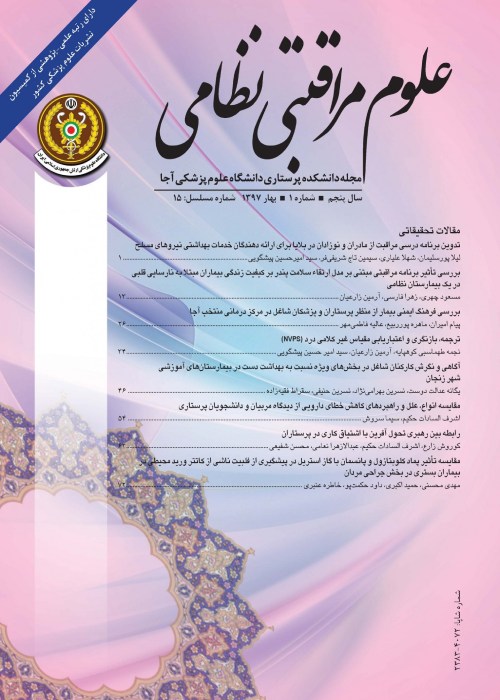The Relationship between Moral Intelligence and Demographic Characteristics of Nurses in the Intensive Care Units
Author(s):
Article Type:
Research/Original Article (بدون رتبه معتبر)
Abstract:
Introduction
Moral intelligence is the ability to distinguish true from false, choose appropriately, and ultimately show ethical behavior. Moral intelligence is considered as an effective factor in increasing commitment, accountability, desirable performance, and achieving the goals of the organization. Based on the results of the study by Lennick and Kiel, moral intelligence is comprised of 4 main components including integrity, responsibility, forgiveness, and compassion that are essential for the continuation of organizational and personal success. Therefore, there is a harmony between the values and beliefs in people with high moral intelligence; they have high performance and always link their actions with moral principles. Nurses are also responsible for their actions due to their highlighted role in health care practices and taking huge responsibilities.Objectives
The current study aimed at investigating the relationship between moral intelligence and some demographic characteristics in nurses of the intensive care units (ICUs).Materials And Methods
The current cross sectional, descriptive-analytical study was conducted on 267 nurses working in the ICUs in Tehran in 2013 selected by the convenience sampling method and examined for moral intelligence. Persian version of the Lennick and Kiel moral intelligence, which its reliability and validity was confirmed previously, was used for data collection. Then, data were analyzed with SPSS version 18 using descriptive and analytical statistics. A P-value Results
The total number of samples was 267 in the age range of 20-50 years, of which 65.54% were female; the majority of study participants was married (73.78%) and had undergraduate education (80.52%). Statistical tests showed that the moral intelligence of most nurses (n=168; 62.9%) was moderate. Also, there was a significant relationship between the gender-dependent variables (P = 0.006), level of education (P = 0.004), overtime hours (P = 0.004), and moral intelligence of nurses in ICUs. There was no significant relationship among age (P = 0.1), work experience (P = 0.09) and marital status (P = 0.3).Discussion and
Conclusion
Based on the nature of nursing profession and relying on the findings of the current research, it is suggested to develop strategic plans, hold in-service ethics workshops, hire qualified nurses, and conduct interventional studies in the same field to enhance moral intelligence and consequently efficiency of health system.Keywords:
Language:
Persian
Published:
Journal of Military Caring Sciences, Volume:4 Issue: 4, 2018
Pages:
281 to 287
magiran.com/p1825342
دانلود و مطالعه متن این مقاله با یکی از روشهای زیر امکان پذیر است:
اشتراک شخصی
با عضویت و پرداخت آنلاین حق اشتراک یکساله به مبلغ 1,390,000ريال میتوانید 70 عنوان مطلب دانلود کنید!
اشتراک سازمانی
به کتابخانه دانشگاه یا محل کار خود پیشنهاد کنید تا اشتراک سازمانی این پایگاه را برای دسترسی نامحدود همه کاربران به متن مطالب تهیه نمایند!
توجه!
- حق عضویت دریافتی صرف حمایت از نشریات عضو و نگهداری، تکمیل و توسعه مگیران میشود.
- پرداخت حق اشتراک و دانلود مقالات اجازه بازنشر آن در سایر رسانههای چاپی و دیجیتال را به کاربر نمیدهد.
دسترسی سراسری کاربران دانشگاه پیام نور!
اعضای هیئت علمی و دانشجویان دانشگاه پیام نور در سراسر کشور، در صورت ثبت نام با ایمیل دانشگاهی، تا پایان فروردین ماه 1403 به مقالات سایت دسترسی خواهند داشت!
In order to view content subscription is required
Personal subscription
Subscribe magiran.com for 70 € euros via PayPal and download 70 articles during a year.
Organization subscription
Please contact us to subscribe your university or library for unlimited access!


